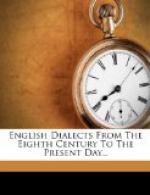Trevisa was also the author of some other works, of which the most important is his translation into English, from the original Latin, of Bartholom{ae}us de Proprietatibus Rerum.
I am not aware of any important work in the Southern dialect later than these translations by Trevisa. But in quite modern times, an excellent example of it has appeared, viz. in the Poems of Rural Life, in the Dorset Dialect, by William Barnes.
CHAPTER VII
THE SOUTHERN DIALECT OF KENT
Though the Kentish dialect properly belongs to Southern English, from its position to the south of the Thames, yet it shows certain peculiarities which make it desirable to consider it apart from the rest.
In Beda’s Ecclesiastical History, Bk I, ch. 15, he says of the Teutonic invaders: “Those who came over were of the three most powerful nations of Germany—Saxons, Angles, and Jutes. From the Jutes are descended the people of Kent, and of the Isle of Wight, and those also in the province of the West-Saxons who are to this day called Jutes, seated opposite to the Isle of Wight”; a remark which obviously implies the southern part of Hampshire. This suggests that the speech of Kent, from the very first, had peculiarities of its own. Dr Sweet, in his Second Anglo-Saxon Reader, Archaic and Dialectal, gives five very brief Kentish charters of the seventh and eighth centuries, but the texts are in Latin, and only the names of persons and places appear in Kentish forms. In the ninth century, however, there are seven Kentish charters, of a fuller description, from the year 805 to 837. In one of these, dated 835, a few lines occur that may be quoted:
Ic bidde and bebeode sw{ae}lc monn se
th{ae}t min lond hebbe th{ae}t
he {ae}lce gere agefe them higum {ae}t Folcanstane
l. ambra maltes,
and vi. ambra gruta, and iii. wega spices
and ceses, and cccc. hlafa,
and an hrithr, and vi. scep.... Th{ae}m
higum et Cristes cirican of
th{ae}m londe et Cealflocan: th{ae}t
is thonne thritig ombra alath,
and threo hund hlafa, theara bith fiftig
hwitehlafa, an weg spices
and ceses, an ald hrithr, feower wedras,
an suin oththe sex wedras,
sex gosfuglas, ten hennfuglas, thritig
teapera, gif hit wintres deg
sie, sester fulne huniges, sester fulne
butran, sester fulne saltes.
That is to say:
I ask and command, whosoever may have my land, that he every year give to the domestics at Folkestone fifty measures of malt, and six measures of meal, and three weys [heavy weights] of bacon and cheese, and four hundred loaves, and one rother [ox], and six sheep.... To the domestics at Christ’s church, from the land at Challock: that is, then, thirty vessels of ale, and three hundred loaves, of which fifty shall be white loaves, one wey of bacon and cheese, one old rother, four wethers,




